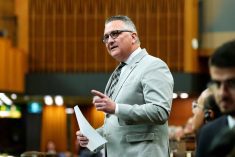Grain Farmers of Ontario is taking the provincial government to court over its controversial regulations for neonicotinoid seed treatments.
Eric Gillespie, who is representing GFO in the legal action, said the organization has filed an application with the Ontario Superior Court asking for an interpretation of the regulations.
“The courts interpret government regulations and legislation all the time,” Gillespie said during a conference call with media June 29.
“The central issue before the court … will be whether this regulation is, in fact, workable.”
This spring, the Ontario government introduced new rules to reduce the use of insecticide seed treatments on corn and soybean seed by 80 percent by 2017.
Read Also

Alberta harvest wrapping up: report
Harvest operations advanced to 96 per cent complete in Alberta as of Oct. 7, with only a few late-seeded cereal and canola fields remaining, according to the latest provincial crop report.
Ontario’s environment minister said the regulations are necessary to protect bees, along with the province’s soil, water and broader ecology. Neonicotinoids, commonly known as neonics, have been linked to bee colony losses in North America and Europe.
The regulations take effect July 1.
GFO and other farm organizations have pushed back against the neonic reduction plan, saying the regulations are not based in science, will cut into crop yields and will do nothing to protect bees.
As part of the regulations, Ontario farmers can use neonic treated seed on only 50 percent of their land in 2016. Farmers who want to use more treated seed will have to submit pest assessment reports to the province to justify the use of neonics.
Gillespie said that requirement is impractical because farmers don’t have enough time to complete the necessary assessments.
“The next time assessments could properly be done is next spring …. (but) seed orders have to be in place in the fall for the upcoming spring,” Gillespie said. “The government system appears to be unworkable. There simply is no time to conduct assessment next spring, have them reviewed and get seed out to farmers, all in the space in just a few weeks.”
Gillespie said legislators cannot craft laws that are unworkable.
“Legally speaking if you pass a law that for practical reasons simply won’t work, that’s known in law as a legal absurdity. That’s what we’ll be asking the court to find in this case.”
GFO chair Mark Brock said the organization believes in collaborating with government on public policy. However, the province has been unwilling to listen to farmers on this matter, so GFO had to take legal action, Brock said.
“We’re challenging this from a legal standpoint because we don’t think they’re workable.”
GFO is asking the Ontario Superior Court to delay the implementation of the regulations until May 1, 2016, or such time that the requirements can reasonably be met.
Gillespie said GFO hopes to be in court later in July.
robert.arnason@producer.com

















